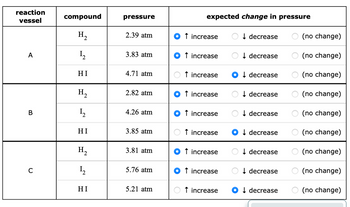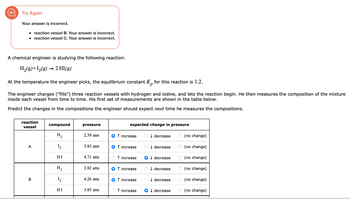H₂(g)+12(g) → 2 HI(g) At the temperature the engineer picks, the equilibrium constant K, for this reaction is 1.2. P The engineer charges ("fills") three reaction vessels with hydrogen and iodine, and lets the reaction begin. He then measures the composition of the mixture inside each vessel from time to time. His first set of measurements are shown in the table below. Predict the changes in the compositions the engineer should expect next time he measures the compositions. reaction vessel A B с compound H₂ 1₂ HI H₂ 1₂ HI H₂ 1₂ HI pressure 2.39 atm 3.83 atm 4.71 atm. 2.82 atm. 4.26 atm 3.85 atm 3.81 atm. 5.76 atm 5.21 atm expected change in pressure Ot increase O decrease Ot increase O decrease Ot increase Ot increase Ot increase Ot increase O decrease O decrease Odecrease O decrease Ot increase O↑ increase O decrease decrease Ot increase O decrease X O(no change) (no change) (no change) (no change) (no change) (no change) O(no change) (no change) (no change) 5
H₂(g)+12(g) → 2 HI(g) At the temperature the engineer picks, the equilibrium constant K, for this reaction is 1.2. P The engineer charges ("fills") three reaction vessels with hydrogen and iodine, and lets the reaction begin. He then measures the composition of the mixture inside each vessel from time to time. His first set of measurements are shown in the table below. Predict the changes in the compositions the engineer should expect next time he measures the compositions. reaction vessel A B с compound H₂ 1₂ HI H₂ 1₂ HI H₂ 1₂ HI pressure 2.39 atm 3.83 atm 4.71 atm. 2.82 atm. 4.26 atm 3.85 atm 3.81 atm. 5.76 atm 5.21 atm expected change in pressure Ot increase O decrease Ot increase O decrease Ot increase Ot increase Ot increase Ot increase O decrease O decrease Odecrease O decrease Ot increase O↑ increase O decrease decrease Ot increase O decrease X O(no change) (no change) (no change) (no change) (no change) (no change) O(no change) (no change) (no change) 5
Chemistry
10th Edition
ISBN:9781305957404
Author:Steven S. Zumdahl, Susan A. Zumdahl, Donald J. DeCoste
Publisher:Steven S. Zumdahl, Susan A. Zumdahl, Donald J. DeCoste
Chapter1: Chemical Foundations
Section: Chapter Questions
Problem 1RQ: Define and explain the differences between the following terms. a. law and theory b. theory and...
Related questions
Question

Transcribed Image Text:A chemical engineer is studying the following reaction:
H₂(g)+I₂(g) → 2 HI(g)
At the temperature the engineer picks, the equilibrium constant
The engineer charges ("fills") three reaction vessels with hydrogen and iodine, and lets the reaction begin. He then measures the composition of the mixture
inside each vessel from time to time. His first set of measurements are shown in the table below.
Predict the changes in the compositions the engineer should expect next time he measures the compositions.
reaction
vessel
A
B
C
compound
H₂
1₂
HI
H₂
1₂
HI
H₂
1₂
HI
pressure
2.39 atm
3.83 atm
4.71 atm
2.82 atm
4.26 atm
3.85 atm
3.81 atm
5.76 atm
5.21 atm
expected change in pressure
↑ increase
increase
↑ increase
↑ increase
↑ increase
↑ increase
↑ increase
for this reaction is 1.2.
р
↑ increase
↑ increase
↓ decrease
↓decrease
↓ decrease
↓ decrease
↓decrease
↓ decrease
↓ decrease
↓decrease
↓ decrease
X
(no change)
(no change)
(no change)
(no change)
(no change)
(no change)
(no change)
(no change)
(no change)
Ś
Expert Solution
Step 1
The reaction quotient Q is a measure of the relative amounts of products and reactants present in a reaction at a given time.
If Q < Kp , reaction proceeds to product side
If Q > Kp , reaction proceeds to reactants side
At equilibrium , Q = Kp
Given Kp = 1.2
Step by step
Solved in 4 steps

Follow-up Questions
Read through expert solutions to related follow-up questions below.
Follow-up Question

Transcribed Image Text:reaction
vessel
A
B
C
compound
H₂
1₂2
HI
H₂
1₂
HI
H₂
1₂2
HI
pressure
2.39 atm
3.83 atm
4.71 atm
2.82 atm
4.26 atm
3.85 atm
3.81 atm
5.76 atm
5.21 atm
expected change in pressure
↑ increase
↑ increase
↑ increase
↑ increase
↑ increase
↑ increase
↑ increase
↑ increase
↑ increase
↓ decrease
↓ decrease
↓ decrease
↓ decrease
↓ decrease
Odecrease
↓ decrease
↓ decrease
↓ decrease
OO
(no change)
(no change)
(no change)
(no change)
(no change)
(no change)
(no change)
(no change)
(no change)

Transcribed Image Text:Try Again
Your answer is incorrect.
• reaction vessel B: Your answer is incorrect.
• reaction vessel C: Your answer is incorrect.
A chemical engineer is studying the following reaction:
H₂(g) + I₂(g) → 2 HI(g)
At the temperature the engineer picks, the equilibrium constant Kp for this reaction is 1.2.
р
The engineer charges ("fills") three reaction vessels with hydrogen and iodine, and lets the reaction begin. He then measures the composition of the mixture
inside each vessel from time to time. His first set of measurements are shown in the table below.
Predict the changes in the compositions the engineer should expect next time he measures the compositions.
reaction
vessel
A
B
compound
H₂
1₂
HI
H₂
1₂
HI
pressure
2.39 atm
3.83 atm
4.71 atm
2.82 atm
4.26 atm
3.85 atm
expected change in pressure
↑ increase
↑ increase
↑ increase
↑ increase
↑ increase
↑ increase
↓ decrease
↓ decrease
↓decrease
↓ decrease
↓ decrease
↓ decrease
(no change)
(no change)
(no change)
(no change)
(no change)
(no change)
Solution
Knowledge Booster
Learn more about
Need a deep-dive on the concept behind this application? Look no further. Learn more about this topic, chemistry and related others by exploring similar questions and additional content below.Recommended textbooks for you

Chemistry
Chemistry
ISBN:
9781305957404
Author:
Steven S. Zumdahl, Susan A. Zumdahl, Donald J. DeCoste
Publisher:
Cengage Learning

Chemistry
Chemistry
ISBN:
9781259911156
Author:
Raymond Chang Dr., Jason Overby Professor
Publisher:
McGraw-Hill Education

Principles of Instrumental Analysis
Chemistry
ISBN:
9781305577213
Author:
Douglas A. Skoog, F. James Holler, Stanley R. Crouch
Publisher:
Cengage Learning

Chemistry
Chemistry
ISBN:
9781305957404
Author:
Steven S. Zumdahl, Susan A. Zumdahl, Donald J. DeCoste
Publisher:
Cengage Learning

Chemistry
Chemistry
ISBN:
9781259911156
Author:
Raymond Chang Dr., Jason Overby Professor
Publisher:
McGraw-Hill Education

Principles of Instrumental Analysis
Chemistry
ISBN:
9781305577213
Author:
Douglas A. Skoog, F. James Holler, Stanley R. Crouch
Publisher:
Cengage Learning

Organic Chemistry
Chemistry
ISBN:
9780078021558
Author:
Janice Gorzynski Smith Dr.
Publisher:
McGraw-Hill Education

Chemistry: Principles and Reactions
Chemistry
ISBN:
9781305079373
Author:
William L. Masterton, Cecile N. Hurley
Publisher:
Cengage Learning

Elementary Principles of Chemical Processes, Bind…
Chemistry
ISBN:
9781118431221
Author:
Richard M. Felder, Ronald W. Rousseau, Lisa G. Bullard
Publisher:
WILEY